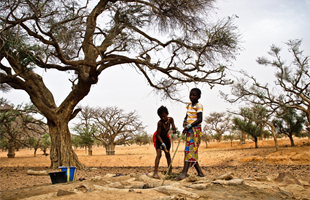The project focused on a strengthened positioning of health issues in the international debate with regards to adaptation to climate change, as well as a higher prioritization of health adaptation at a national level.
The problem
Health protection is one of the central justifications for action on climate change. While uncertainties remain, there is strong evidence to justify strengthening the resilience of health systems, to slow and eventually halt human interference with the climate and associated damage to life-supporting ecosystem services, and ensure that mitigation and adaptation actions also serve to protect and promote health. These are now represented both in formal government agreements, and declarations endorsed by some of the largest global public health associations.
 There is some encouraging progress on integrating climate change and health, but the challenge remains in converting this clear scientific evidence into political will and programmatic means to support climate-resilient development, at the same time as enhance health protection. The most urgent need is within Least Developed Countries, and Small Island Developing States, where climate vulnerability is greatest.
There is some encouraging progress on integrating climate change and health, but the challenge remains in converting this clear scientific evidence into political will and programmatic means to support climate-resilient development, at the same time as enhance health protection. The most urgent need is within Least Developed Countries, and Small Island Developing States, where climate vulnerability is greatest.
The goal
The overall objectives of the programme ‘Adaptation to Climate Change in the Health Sector’ focused on a strengthened positioning of health issues in the international debate on adaptation to climate change and a higher prioritization of health adaptation at a national level. This project concentrated on the health sector in African and South-East Asian countries by improving engagement, evidence and action.
The project
In 2013 the German Federal Ministry for Economic Cooperation and Development (BMZ) commissioned the Deutsche Gesellschaft für Internationale Zusammenarbeit (GIZ) GmbH to implement the programme ‘Adaptation to Climate Change in the Health Sector’ and support the climate change and health workplan. The current agreement covers the period October 2013- December 2014.
This overall objective was defined by the following outcomes:
1. Engagement: Health to be better reflected as a priority area within the climate change negotiations
2. Evidence: An improved Evidence-Base for scaling up health protection from climate change.
- Synthesis report on lessons learned from the first five years of implementation of health adaptation projects in low and middle income countries (2008-2013).
- Identification of barriers, challenges and opportunities for scaling up of adaptation interventions.
- Technical guidance on methods and assessment of climate change public health risks and country capacities for management and overcome of barriers to implementation and scale up of adaptation interventions.
3. Action: Implementation of health vulnerability and adaptation assessments in four African countries (Guinea, Madagascar, Malawi and Zambia.
Partners
The project was a joint collaboration between WHO and GIZ. The partnership brought together the comparative advantages of GIZ in terms of integrated development programming, capacity building and direct bilateral support for implementation, with those of WHO in leading international health policy, providing technical support to national Ministries of Health and related agencies, as well as WHO's' global experience in piloting innovative approaches for building climate resilience, and adapting health systems to the long-term challenges of climate change, in collaboration with a range of national and international partners.
The future
The project continued until 2015. Expanding on this initial collaboration, further progress has since been booked within the participating countries, and their experience and lessons learned have been made available to other countries and development cooperation programmes.
Read More
